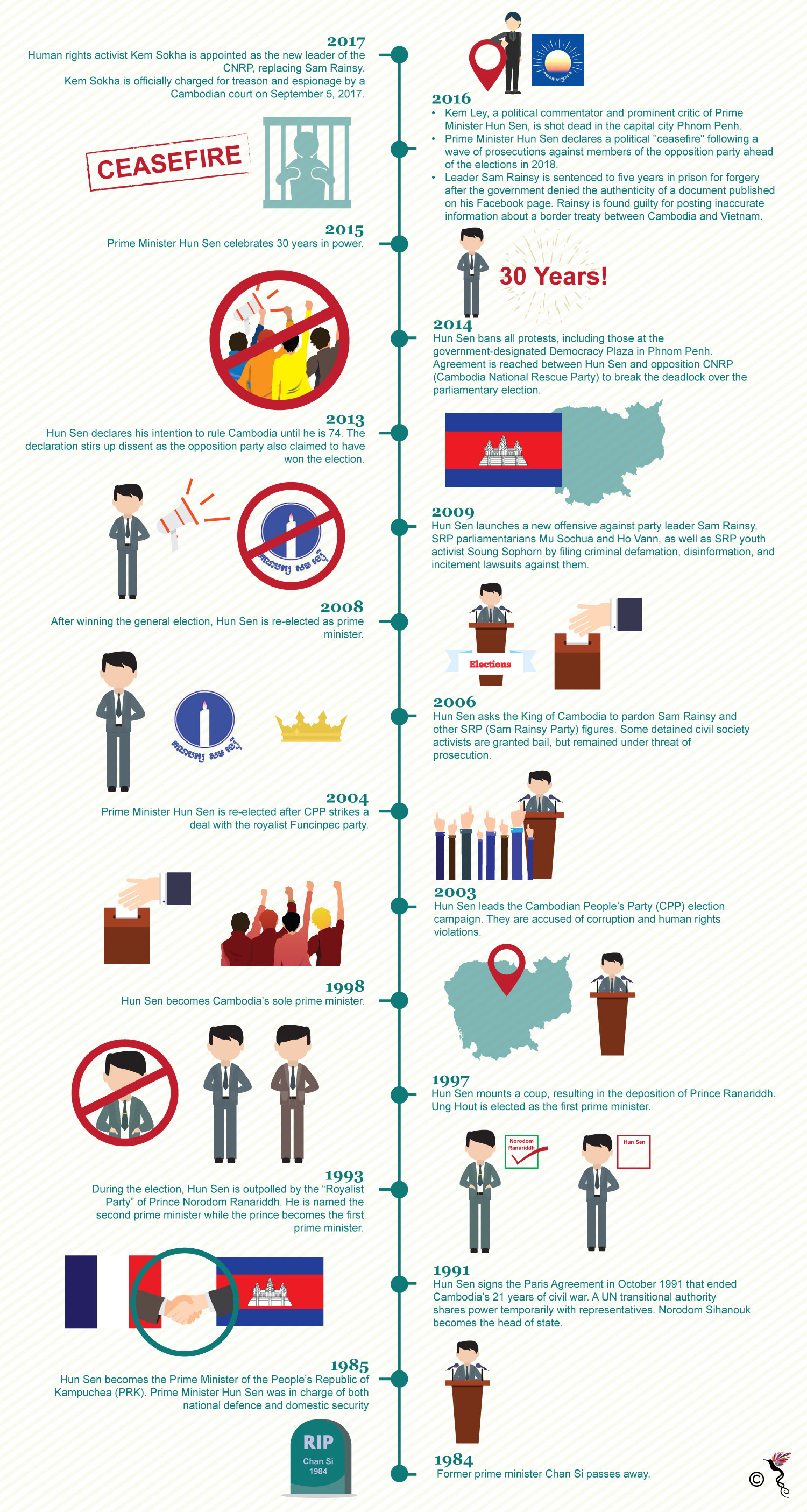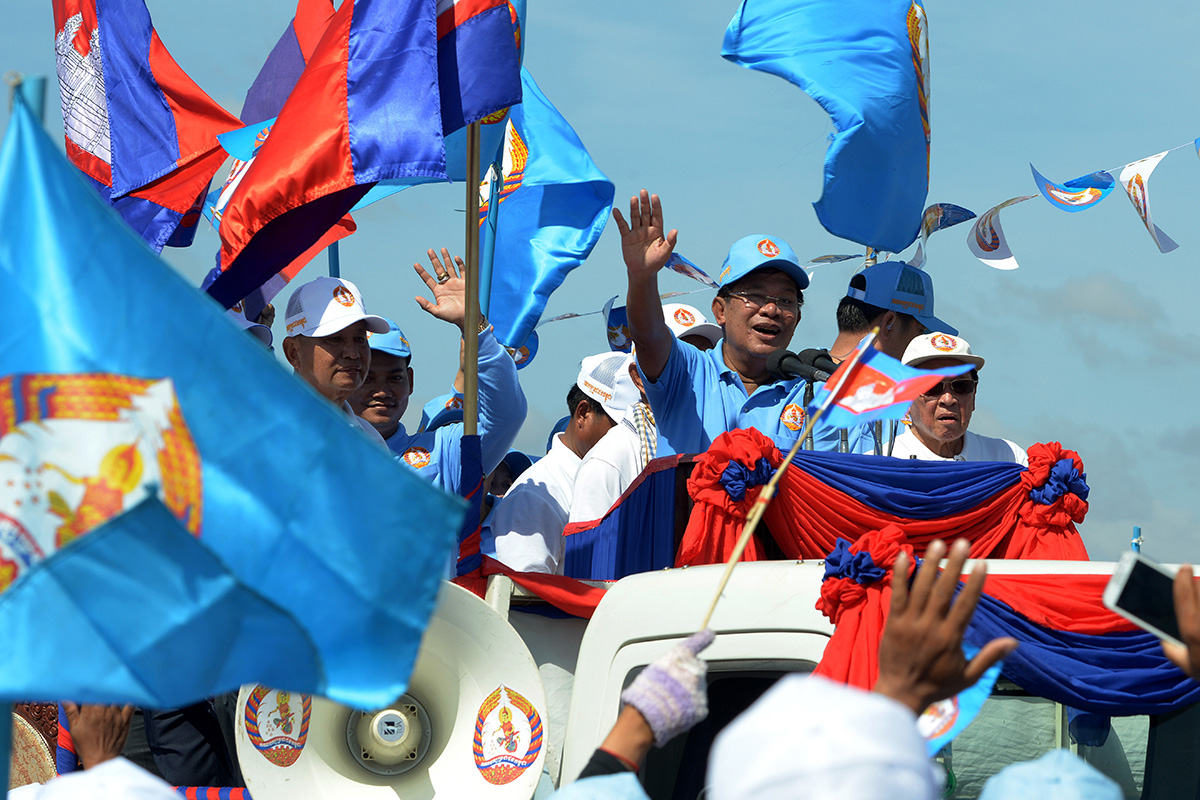The future of Cambodia’s political landscape is undoubtedly looking bleak. Cambodian Prime Minister Hun Sen, who has ruled since 1985 is known to silence critics and hold the media on a tight leash especially with national elections scheduled for next year.
In early September, the 24-year-old Cambodia Daily published its final headline, “Descent into Outright Dictatorship”, before being forced to halt its publication due to a 6.3 million dollar tax backlog which had to be settled within a month. The government claims it is merely complying to standard operating procedures but the independent daily described the move as an “extra-legal threat”. On Sunday, approximately 200 armed policemen, in commando fashion, swooped into the house of the opposition leader Kem Sokha without an arrest warrant and carted him away to a prison near the Cambodian-Vietnam border. Hun Sen alleged that Sokha had been plotting with foreign entities to overthrow his government, a move tantamount to treason. The government based its actions on a speech delivered by the opposition leader four years ago when he admitted to receiving American advice to build a strong Cambodian opposition movement.
In an email interview with The ASEAN Post, Monovithya Kem, daughter of the arrested opposition leader said that, “There is nothing in particular that 'triggered' Kem Sokha's arrest other that there is an election coming up and the ruling party wants to cripple CNRP (Cambodian National Rescue Party)”. She added alarmingly that Hun Sen’s actions prove that his regime is out to make sure that “the 2018 elections will not be free and fair”.
International observers have been quick to see through Hun Sen’s prevarication and point to his government’s diminished majority in recent local elections. The possibility of the opposition making further headway in the upcoming national elections is likely the reason for his escalating attacks on Cambodian checks and balances like the media and the opposition, which have been critical of his leadership.
“Cambodia is entering one of the darkest era of its history”, wrote Senior Fellow at the Cambodian Institute for Cooperation and Peace, Vannarith Chheang in an email reply to The ASEAN Post. He opined further that the Cambodian government has gone overboard with regards to its recent suppression and this has incurred high political and social costs on the opposition and media.

Timeline of Hun Sen's 32-year rule.
“Peace, democracy, and the rule of law are interconnected. There is no peace without justice and genuine democracy”, Chheang stated.
The main opposition party in Cambodia, the CNRP led by Sokha recorded impressive gains amongst Cambodians during communal elections in June. Riding on a record wave of support, it is expected to bludgeon Hun Sen’s CPP (Cambodian People’s Party) in the upcoming general elections. Back in 2013, the CNRP successfully reduced the CPP’s majority by 22 seats, in the 123-member National Assembly, leading its spokesperson, Yim Sovann to declare, “after the 2018 election the CNRP will rule the country”.
However, Hun Sen would not allow such opposition to manifest any further. According to Associate Professor of Diplomacy & World Affairs at Occidental College, Sophal Ear, the Cambodian premier desires a win, at any cost even if he must dismantle the opposition. “It’s clear there is a very strong imperative to tidy-up some unfinished business and deliver an electoral victory in 2018, however hallow”, he wrote in an email response to The ASEAN Post.
The increasing support base of the opposition is more than enough reason for Hun Sen to be worried for his own political survival. Since assuming the country’s premiership in 1985, he has continued to enrich himself and an elite few who remain steadfastly loyal to him while exercising brute force to restrain Cambodians from questioning his amassed fortune. The country has seen the rise and fall of several opposition parties in recent history, and right now, the CNRP seems to be the best bet for Cambodians who desire palpable reform of the country’s horrendous state of democracy.
A 2017 Human Rights Watch report described Hun Sen’s escalating persecution of his critics as a method to "prevent victory or create conditions for overturning victory by the opposition". His tyrannical ways are hardly a break from the norm. For over 30 years, Cambodians have witnessed their premier make brazen statements against his opponents that he would “beat all those dogs and put them in a cage” and even once asked his critics to “prepare coffins and say their wills to their wives”.
Things are unlikely to change given Hun Sen’s aspirations to continue being Cambodia’s leader until 2026, at the ripe old age of 74. As Cambodians head for the polls next year, now more than ever, it is unclear if their vote would be an exercise of democracy or merely an inconsequential action.
